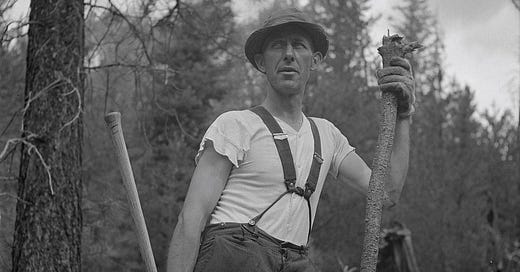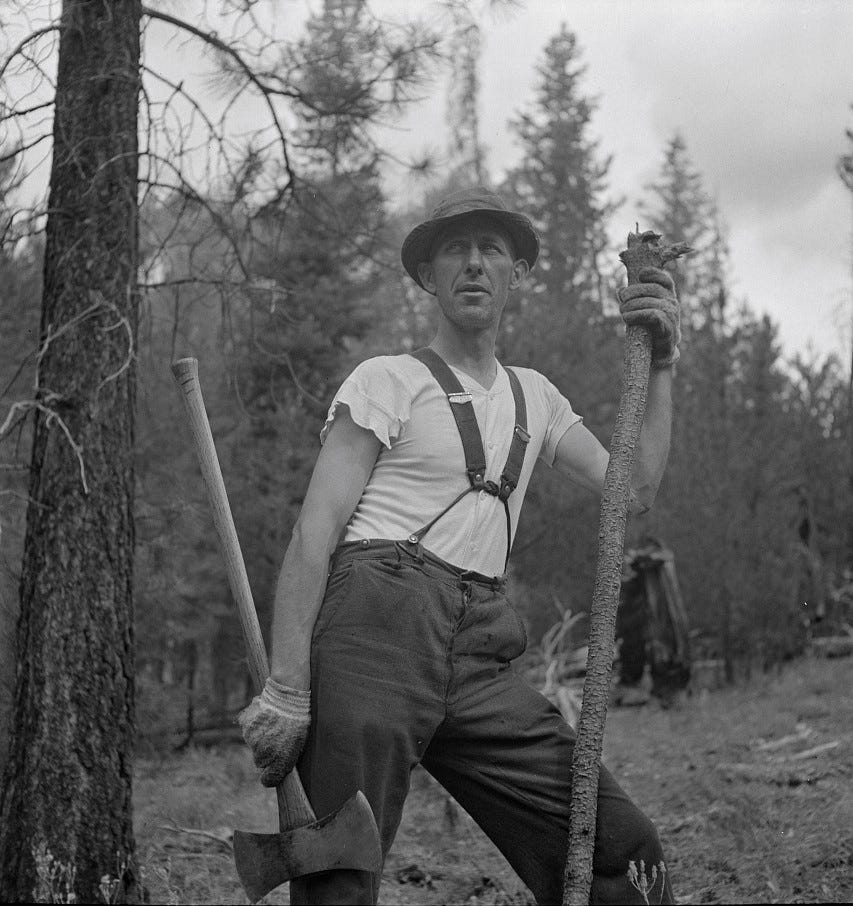"Leaf by Niggle" and the Redemption of Work
In 1943, J. R. R. Tolkien’s work ground to a halt. As biographer Humphrey Carpenter has recounted, halfway through drafting The Lord of the Rings, Tolkien did know how to go on. Resolving the story required him to coordinate multiple storylines. Making matters more difficult was his perfectionism. He wanted to make the story seem real. That meant he needed to answer a host of questions. Which moon would look down on a certain scene? Where were places located in relation to one another? When would certain things happen, given the distances characters had to travel? What happened on particular dates? For the moment, The Lord of the Rings had defeated Tolkien. “How could he ever find the time and energy to finish it . . . ?” Carpenter wrote. “He was fifty-one, tired, and fearful that in the end he would achieve nothing.”
During this unhappy season, Tolkien wrote “Leaf By Niggle,” the story of a dedicated but hapless painter who is trying to complete his “great picture,” a massive landscape painting incorporating much of his life’s work as well fresh creations. Although the impasse in Middle Earth that inspired “Leaf by Niggle” was unique to Tolkien, the story has insights for workers of all kinds. In “Leaf by Niggle” Tolkien showed that work in this life is extremely disappointing, partly because of workers’ flaws and partly because of circumstances. But Tolkien also believed that work could be redeemed, partly through one’s maturation but ultimately through divine grace.
Workers undermine themselves in a host of ways, according to Tolkien. They fail to accept their limits. Most paintings that Niggle attempts are “too large and ambitious for his skill” because he is “a very ordinary and rather silly little man.” And so, despite all his effort, even his masterwork is “not really a very good picture.” Workers also get lost in details instead of focusing on the project as a whole. Niggle “can paint leaves better than trees” and will “spend a long time on a single leaf.” And workers fritter away hours that could go to their work. “Look at the time he wasted,” an accuser says against Niggle, “not even amusing himself!”
A hard world also prevents work from blossoming. Workers face many demands on their time other than the work they want to do. None is more unforgiving than the “long journey” – death – which sets a hard limit on one’s available time. Limited to his lifespan, Niggle knows that his painting must “stop just growing and get finished” and must accept that it contains “some corners where he would not have time now to do more than hint at what he wanted.” But making life’s limited duration worse is the “interruptions” that drain one’s precious time. Niggle resents such things as “a nuisance.” He has to complete mandatory tasks, such as jury duty and keeping his garden up to code. Then he is drawn away by optional activities. Because he is “kind-hearted,” he devotes a lot of time to meeting the needs of others, especially his neighbor Parish, who is “often in trouble and in need of help” because of a bad limp. He also takes time with his friends and tries to get ready for his journey. He also endures loss of time to mishap when he gets sick. In the end, when death takes Niggle, he cries out that his painting is “not even finished!”
Workers often put much more into their work than they receive back in appreciation. Niggle wants to receive payment for his masterwork so that he need not invest time in earning income other ways, but he works for free. Niggle longs to hear someone say, “Absolutely magnificent! I see exactly what you are getting at,” but no one does. Instead, Parish nags him about his weedy garden. After Niggle’s death, most of his painting is used to repair a house. One part survives to make it into a museum where it receives the faint appreciation of being “noticed by a few eyes” – until the museum burns down. A local official dismisses Niggle. He was not one of the “bold young men not afraid of new ideas and new methods.” He should have been interested in painting public information posters. Instead, he was “old-fashioned,” one of the “useless people” because he loved painting flowers. Niggle, he says, should have been euthanized.
In short, workers’ hearts are full of passionate yearnings, but what they long for remains out of reach because time, talent, and others’ attention are scarce.
Despite human frailties, Tolkien believed one’s work could still have some good in it. Niggle’s masterwork is not entirely in vain. “It may have had some good passages,” including the tree, which is “quite unique in its way.” One of Niggle’s neighbors said he was captivated by mulling on a small bit of Niggle’s masterwork that survived, an image of “a mountain-peak and a spray of leaves.” Furthermore, the minor things one loves to work on can have value. After death, an advocate takes up for Niggle saying, “He took a great deal of pains with leaves, just for their own sake.”
Tolkien, a devout Christian, believed that God’s grace is the ultimate hope for the worker. Niggle’s journey terminates at the Workhouse Infirmary, where he is put through a divinely ordained growth regimen. After the Workhouse, Niggle enters eternal life, which Tolkien depicted as the place where God brings his people’s work to fruition. There, Niggle sees “his Tree, finished.” Niggle’s flawed masterwork on earth is glorified into a real landscape in eternity. Tolkien wrote that the leaves were “as he had imagined them rather than as he had made them; and there were others that had only budded in his mind, and many that might have budded, if only he had time.” Niggle exclaims, “It’s a gift!” In eternity, Niggle can focus on the work he loved. For all the limits to his talent, he is “a painter by nature,” according to the advocate. His task is to flesh out certain areas, including adding a “small house and garden.”
Tolkien did not only depict the place of the worker as waiting for the New Jerusalem. He also implied how workers ought to change now in order to to redeem their work. They must cease to see people as obstacles to their work. At the Workhouse, the accuser condemns Niggle for resenting the needs of others. Other people can even be assets to one’s work. Niggle finds that somehow Parish contributed to some of the leaves on the glorified tree that were “the most beautiful” or the most shaped by “the Niggle style.” Niggle, it turns out, cannot become fully himself without his annoying neighbor. Parish continues to help. He appears in the glorified landscape, and his expertise in gardening helps Niggle to finish it. Tolkien also suggested that part of the worker’s growth is learning to enjoy work toward which one once felt only apathy. In the completed landscape, Niggle, who once neglected his garden, is more “absorbed in building and gardening” than Parish, while Parish, who failed to appreciate Niggle’s work before the long journey, in the glorified landscape becomes more interested in trees than Niggle. And Tolkien suggested that mature workers let things go. The additions to the landscape have an ending. Niggle works on them only “up to a definite point” then moves on.
Tolkien also suggested how workers ought to mature by depicting Niggle’s development in the Workhouse. Workers must learn discipline. In the Workhouse, Niggle is given limited time on all his tasks, announced by the ringing of bells. The glorification of Niggle’s work suggests that Tolkien believed that there was value in giving some time to realizing one’s grandest visions, but Tolkien also suggested that workers must learn to match their goals and abilities. Niggle has his excessive ambition broken. His new assignment is “digging, carpentry, and painting bare boards all one plain colour.” Workers also need to be weaned of the demand for praise. In the Workhouse, Niggle receives none. Tolkien even suggested that a limited period of ceaseless toil could be useful, for he depicted Niggle enduring a period of digging holes with almost no sleep. But he also indicated the value of refraining from work, for immediately afterwards a doctor orders Niggle to undergo “Complete rest – in the dark.”
Tolkien suggested the value of these changes by showing the fruit they bear in Niggle’s life. Early in his time at the Infirmary he is prone “to worry aimlessly about the past,” full of regret that he did not find more time for his painting. His growth regimen chases this concern from his mind. Endless digging stills his anger at those who interrupted his work. Once he stops trying to do what is too much for him, his work becomes more beneficial to others. Tolkien wrote, “Probably he really became rather useful.”
Under the growth regimen, Niggle’s life begins to deliver “satisfaction” instead of “pleasure.” One reason life becomes more meaningful is greater productivity. Tolkien wrote that Niggle “got through quite a lot in a day, now.” While much of his work spans long periods, he also finishes many tasks. Another reason is that he is “becoming master of his time.” That means that he no longer overestimates what he can achieve. Tolkien wrote, “he began to know just what he could do with” his time. Whereas the Niggle who tried to achieve more than he was designed for and worked without discipline was frantic, the renewed Niggle has peace because his objectives fit his available time. Tolkien wrote: “There was no sense of rush. He was quieter inside now, and at resting-time he could really rest.”
At work on his own “great picture,” Tolkien saw value in workers’ deepest longings but also believed they needed to grow to not only face the grind of this life but also be ready to someday do their ideal work.




